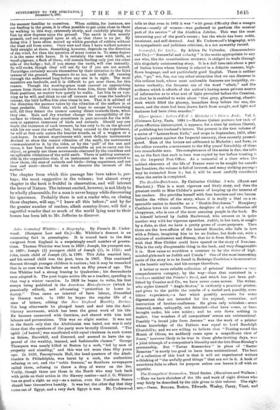John Greenleaf Whittier : a Biography. By Francis H. Under-
wood. (Sampson Low and Co.)—Mr. Whittier's descent is an interesting fact in genealogies. It is traced back to the first emigrant from England in a surprisingly small number of genera- tions. Thomas Whittier was born in 1620 ; Joseph, his youngest eon, in 1669 ; Joseph (2) youngest child of Joseph (1), in 1716 ; and John, tenth child of Joseph (2), in 1769. This John married late, and his second child was the poet, born in 1807. This continued descent through younger children is curious ; but it may be remarked that in no case was the father as much as fifty years of age. The first Whittier had a strong leaning to Quakerism ; his descendants soon adopted it. The poet began active life as a teacher, spending in that way a winter vacation. In 1828 he began to write, his first essays being published in the American Manufacturer (which he practically edited), and advocating "protection to home in- dustry." Then came an interval of farm labour,. diversified by literary work. In 1830 he began the regular life of a man of letters, editing the New England Monthly Review. Not long afterwards he plunged heart and soul into the Anti- Slavery movement, which has been the great work of his life. He became connected with Garrison, and shared with him both labours and persecutions. This was no slight matter. It was not in the South only that the Abolitionist was hated, nor was it only there that the speakers of the party were brutally ill-treated. " The spirit [of hatred] was manifested with equal virulence in en& towns as Salem, Haverhill, and Concord, and seemed to have the ap- proval of the wealthy, learned, and fashionable classes." George Thompson was nearly killed at Boston by a mob, "led by men of property and standing," and this was not more than fifty years ago. In 1838, Pennsylvania Hall, the head-quarters of the Aboli- tionists in Philadelphia, was burnt by a mob, the authorities refusing to act, and the "noble firemen," as Southern newspapers called them, refusing to throw a drop of water on the fire, Verily, though there are those in the North who may look back with pride on their action in the Slavery matter—and J. G. Whittier has as good a right, as any—as a nation, even the Northern States ebeuld bear themselves humbly. It was but the other day that they came out of Egypt, and a very dark Egypt it was. Mr. Underwood
tells us that even in 1863 it was "with great difficulty that a meagre chorus—mostly of women—was gathered to perform the musical part of the service " of the Abolition Jubilee. This was the most interesting part of the poet's career ; but the whole has been noble, consistent, and self-devoted. And Mr. Underwood's biography, with its sympathetic and judicious criticism, is a not unworthy record.


















































 Previous page
Previous page